Resistance, No. 6
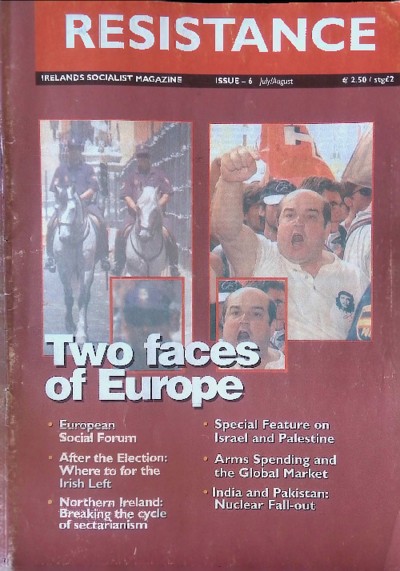
| Date: | 2002 |
|---|---|
| Organisation: | Socialist Workers' Party |
| Publication: | Resistance |
| Issue: | Number 6 July/August 2002 |
Contributors:
Info | Kieran Allen, Nick Barrett, Richard Boyd Barrett, Simon Basketter, Colm Bryce, Marnie Holborow, Goretti Horgan, Brian Kelly, Sinéad Kennedy, Conor Kostick, Grace Lally, Donacha MacRaghnaill, Eamonn McCann, Ryan McKinney, Colm O'Riain, Áine Suttle, Kevin Wingfield |
| Type: | Publication Issue |
| View: | View Document |
| Discuss: | Comments on this document |
| Subjects: | General Election, 2002 |
Please note: The Irish Left Archive is provided as a non-commercial historical resource, open to all, and has reproduced this document as an accessible digital reference. Copyright remains with its original authors. If used on other sites, we would appreciate a link back and reference to The Irish Left Archive, in addition to the original creators. For re-publication, commercial, or other uses, please contact the original owners. If documents provided to The Irish Left Archive have been created for or added to other online archives, please inform us so sources can be credited.
Commentary From The Cedar Lounge Revolution
7th February 2022
Many thanks to the person who scanned and forwarded this to the Archive. This is a significant addition to the selection of Socialist Workers Party materials held here.
Resistance, billed as Ireland’s Socialist Magazine, was produced by the SWP. As an advert for it notes: “Resistance is the bi-monthly magazine of the Socialist Workers Party (Ireland)”
This edition from July/August 2002 has a very wide range of articles contained within.
There are pieces on Genoa, the roots of Zionism, and another piece on anti-Semitism. A piece by Richard Boyd-Barrett considers the then recent General Election. Grace Lally has a piece on the European Social Forum in Florence. Sinead Kennedy looks at ‘the role of the World Bank in global capitalism’. Goretti Horgan considers ‘how sectarianism feeds off poverty in the North’.
In the piece by Richard Boyd-Barrett he notes the gains by the Green Party and Sinn Féin and argues that:
Although small, both parties had a national profile and were seen to be untainted by corruption. Both parties spoke about the need for ‘clean politics’, equality, a defence of public services and the environment. Both parties were perceived to be working on the ground and were often associated with local campaigns and street politics. For people who felt that the political establishment was a million miles from their concerns Sinn Fein seemed like a viable and radical left alternative. Joe Higgins, Socialist Party, and Independents like Seamus Healy and Finian McGrath were also associated with grass roots campaigning and benefited from the mood.
And he suggests that:
Socialists should not make the same mistake in the local elections in two years time. A bloc of the SP, SWP and the WP with smaller groupings could have a real impact. But, of course, it’s on the front of real struggles that a Socialist bloc is even more vital. Mass action, socialist organisation and the leadership it can offer will be necessary if we are to pose a real challenge to the establishment in this country. A united left could offer that kind of leadership but it will require the end to petty squabbling and sniping. The Socialist Workers Party is committed to pursuing that end – we hope that others on the left will join us. The alarming resurgence of the far right across Europe is a warning of what might await if we don’t pass this test.
Goretti Horgan in the piece on sectarianism notes:
While the bulk of sectarian attacks are by loyalists on Catholics. there is a growing trend of attacks on Protestants in places where they are in a minority – such as the stoning of school buses carrying Protestant kids in Strabane or attacks on the Fountain enclave in Deny. And there are attacks also on anti-sectarian Protestants by loyalist thugs. The Church of Ireland rectory at Glenavy, Co. Antrim was attacked, because the vicar. Rev. Eric Storey, has written a book calling on the Church of Ireland to break its links with the Orange Order. So how can sectarianism be growing almost ten years into the peace process and four years since the Assembly was established?
And she writes:
There is an alternative to the vicious cycle of sectarianism. It lies in the tradition of Protestant and Catholic workers uniting to fight as a class against the bosses. One trade unionist, born and bred on the Shankill, regularly complains ‘there is no solution to the problems of working people on the Shankill which does not also help the people of the Falls – and vice versa. When are people on both sides going to see that?’ Down through history, they have seen just that – there is a need for unity every week in workplaces across the North.
The editorial argues that the next challenge is the Nice Treaty which had been signed in 2001, defeated in a referendum in Ireland in that year and was facing a second referendum.
The pressure is on as regards the Nice Treaty. The new jubilant FF/PD government is gearing up for a campaign to get the Treaty passed, preparing to go to any lengths to discredit those campaigning against it. In the first campaign the Government underestimated the degree of opposition. Presenting Nice to us a second time may just blow up in their faces. The reasons for opposing Nice are still valid.
And:
Resistance stands with the anti-capitalists, environmentalists, socialists and anti-racists who oppose the corporate interests that are destroying people’s lives. 57 million people in the EU are living below the poverty line. The EU establishment is doing nothing to tackle the needs of these people. The EU has little to offer us but unemployment, redundancies, stagnant economies and the privatisation of our services. Every time the EU leaders get together for a summit, huge numbers of people gather to tell them that their Europe is too militaristic, too profit-driven, too dismissive of the environment and unrepresentative of the people. After the general strike that coincided with the June EU summit in Seville, in which 1.5 million people took part, the Seville Social Forum called two days of protests and meetings entitled ‘Against a Europe of Capital and War’. That is the message that we need to send to those who would ram the Nice Treaty down our throats.
There are also a number of book reviews including Shostakovich, Feeny’s A hundred turbulent years (of SF), Tariq Ali’s The Clash of Fundametalisms and Paul Ginsborg’s ltaly and its discontents. And the last page has a column from Eamonn McCann on ‘Fine Gael’s difficulties’.
More from Socialist Workers' Party
Socialist Workers' Party in the archive
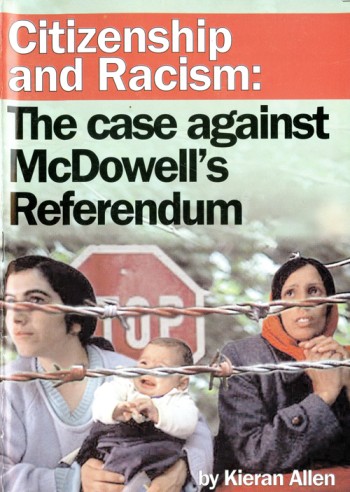
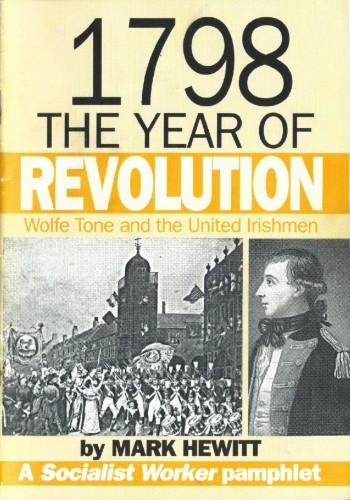
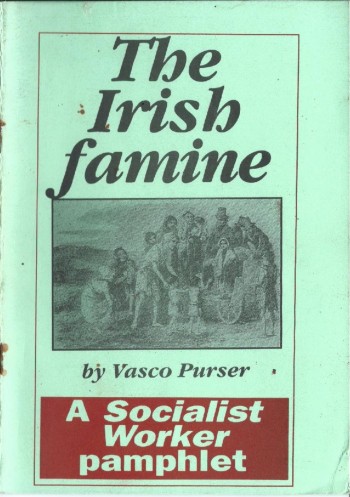
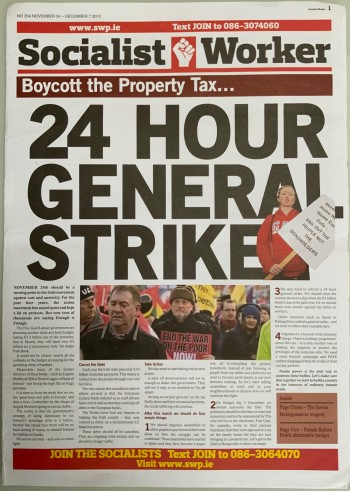
Comments
No Comments yet.
Add a Comment
Comments can be formatted in Markdown format . Use the toolbar to apply the correct syntax to your comment. The basic formats are:
**Bold text**
Bold text
_Italic text_
Italic text
[A link](http://www.example.com)
A link
You can join this discussion on The Cedar Lounge Revolution
By: banjoagbeanjoe Mon, 07 Feb 2022 12:41:15
SWP changed their name to Socialist Workers Network didn’t they? Where and what are they at now?
They’re in PbP. How much control do they have of PbP?
For example, are there PbP branches that don’t have SWN members? Are all PbP councillors also SWN members? (Ok, I know RISE is in there now, so leave them aside, I’m thinking of people who join PbP off their own bat).
How much of an eye does SWN keep on PbP branches and activity and how do they keep such activity in line with the SWP line? Or do they?
Do they recruit within PbP? Do they do a tap on the shoulder to PbP activists who seem to have whatever it takes to be a good SWN cadre?
Genuinely asking these questions as with Solidariy in the doldrums PbP is pretty much the only game in town in terms of far/further left stuff in Ireland.
Maybe Petty Burgess might have an insight into all this?
Reply on the CLR
By: eoghan Mon, 07 Feb 2022 13:33:27
In reply to banjoagbeanjoe.
The reason SWP changed to SWN was because the focus was on building PBP as The Force on the radical left in Ireland and not just as an SWP “front”, i.e. it became a “network” rather than a “party” in its own right. Prior to RISE joining a lot of the most active PBP members were also SWN members, but there are plenty of PBP branches around the country now which might only have one or no SWN members in them. The SWN branches (or “clusters” as they’re called internally) and national committees still meet regularly to discuss political education and strategy, but there’s no line enforced when it comes to PBP, and the position of the SWN is that they want to avoid that sort of factionalism within PBP. RISE and SWN currently coexist amicably as two separate networks, along with a third smaller one called the “Red Network” associated with Rebel Telly. SWN does still try and encourage PBP members to come along to SWN branch meetings and join if they’re interested, but it isn’t done in any sort of “competitive” way or the expense of other networks. The intention is to build up a broad Marxist cadre “in the tradition of James Connolly” within PBP rather than specifically a Cliffite line that some of the more traditional old-SWP cadre might hold, and ultimately to try steer PBP away from any potential reformist paths.
Though the relationship between the internal networks and the party as a whole is still an ongoing discussion so there could likely be changes to the above in the near future.
Reply on the CLR
By: WorldbyStorm Mon, 07 Feb 2022 14:26:00
In reply to eoghan.
That’s a great overview eoghan. Got to say it seems – and accepting all such structures will have pinch points and contradictions, like an excellent way forward. Impressive actually.
Reply on the CLR
By: banjoagbeanjoe Mon, 07 Feb 2022 17:01:49
In reply to eoghan.
Yep. Thanks eoghan.
Reply on the CLR